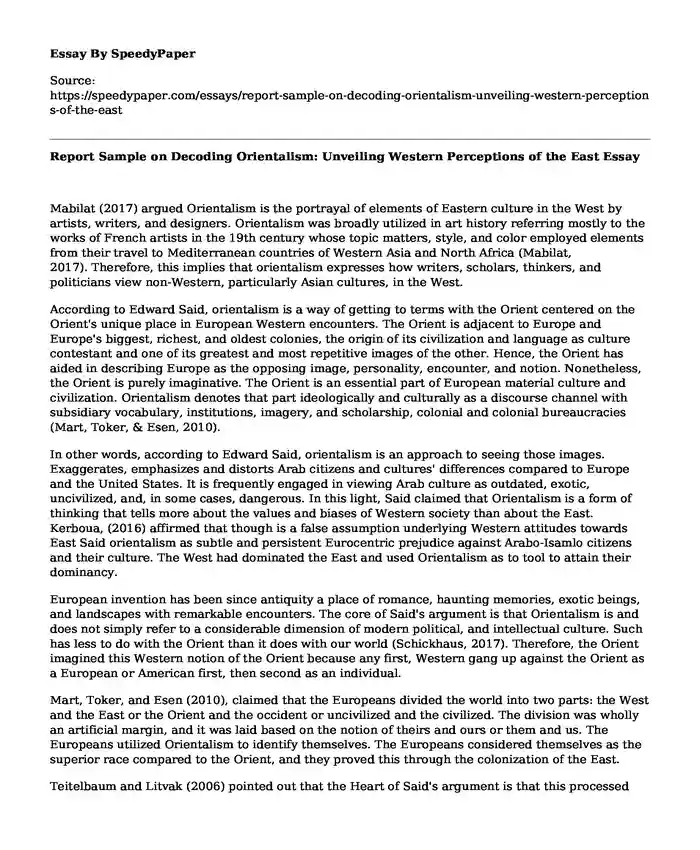
| Type of paper: | Essay |
| Categories: | Culture |
| Pages: | 3 |
| Wordcount: | 755 words |
Mabilat (2017) argued Orientalism is the portrayal of elements of Eastern culture in the West by artists, writers, and designers. Orientalism was broadly utilized in art history referring mostly to the works of French artists in the 19th century whose topic matters, style, and color employed elements from their travel to Mediterranean countries of Western Asia and North Africa (Mabilat, 2017). Therefore, this implies that orientalism expresses how writers, scholars, thinkers, and politicians view non-Western, particularly Asian cultures, in the West.
According to Edward Said, orientalism is a way of getting to terms with the Orient centered on the Orient's unique place in European Western encounters. The Orient is adjacent to Europe and Europe's biggest, richest, and oldest colonies, the origin of its civilization and language as culture contestant and one of its greatest and most repetitive images of the other. Hence, the Orient has aided in describing Europe as the opposing image, personality, encounter, and notion. Nonetheless, the Orient is purely imaginative. The Orient is an essential part of European material culture and civilization. Orientalism denotes that part ideologically and culturally as a discourse channel with subsidiary vocabulary, institutions, imagery, and scholarship, colonial and colonial bureaucracies (Mart, Toker, & Esen, 2010).
In other words, according to Edward Said, orientalism is an approach to seeing those images. Exaggerates, emphasizes and distorts Arab citizens and cultures' differences compared to Europe and the United States. It is frequently engaged in viewing Arab culture as outdated, exotic, uncivilized, and, in some cases, dangerous. In this light, Said claimed that Orientalism is a form of thinking that tells more about the values and biases of Western society than about the East. Kerboua, (2016) affirmed that though is a false assumption underlying Western attitudes towards East Said orientalism as subtle and persistent Eurocentric prejudice against Arabo-Isamlo citizens and their culture. The West had dominated the East and used Orientalism as to tool to attain their dominancy.
European invention has been since antiquity a place of romance, haunting memories, exotic beings, and landscapes with remarkable encounters. The core of Said's argument is that Orientalism is and does not simply refer to a considerable dimension of modern political, and intellectual culture. Such has less to do with the Orient than it does with our world (Schickhaus, 2017). Therefore, the Orient imagined this Western notion of the Orient because any first, Western gang up against the Orient as a European or American first, then second as an individual.
Mart, Toker, and Esen (2010), claimed that the Europeans divided the world into two parts: the West and the East or the Orient and the occident or uncivilized and the civilized. The division was wholly an artificial margin, and it was laid based on the notion of theirs and ours or them and us. The Europeans utilized Orientalism to identify themselves. The Europeans considered themselves as the superior race compared to the Orient, and they proved this through the colonization of the East.
Teitelbaum and Litvak (2006) pointed out that the Heart of Said's argument is that this processed Orient was both an outcome of and a supporter of Western power over the Orient Orient. In other words, he claims that to believe that Orient was formulated and to believe that such things occur, as an essential of the imagination is to be dishonest.
The relationship between Orient and Occident is a relationship of supremacy, of varying magnitude of complex hegemony as a basis for his definition of Orientalism as an Occidental discourse, a knowledge configuration applying power over the dominant Orient. Said argues that one must investigate orientalism as a discourse to comprehend the enormously systematic discipline by which European culture could manage and even generate.
References
Kerboua, S. (2016). From Orientalism to neo-Orientalism: Early and contemporary constructions of Islam and the Muslim world. Intellectual Discourse, 24(1).https://journals.iium.edu.my/intdiscourse/index.php/id/article/view/681
Mobile, C. (2017). Orientalism and representations of music in the nineteenth-century British popular arts. Routledge. https://doi.org/10.4324/9781315090252
Mart, Ç. T., Toker, A., & Esen, M. F. (2010). Criticism on Edward Said’s Orientalism. In 2nd International Symposium on Sustainable Development (pp. 8-9). https://core.ac.uk/download/pdf/153447456.pdf
Schickhaus, T. A. (2017). From Postcolonial Criticism to Critics on Postcolonial Poetics–Edward Said's Orientalism from an Iconographic Perspective. Middle East-Topics & Arguments, 8, 13-23. https://doi.org/10.17192/meta.2017.8.6185
Teitelbaum, J., & Litvak, M. (2006). Students, teachers, and Edward Said: taking stock of Orientalism. Middle East Review of International Affairs, 10(1), 23-43. https://d1wqtxts1xzle7.cloudfront.net/63971263/Teitelbaum
Cite this page
Report Sample on Decoding Orientalism: Unveiling Western Perceptions of the East. (2024, Jan 08). Retrieved from https://speedypaper.net/essays/report-sample-on-decoding-orientalism-unveiling-western-perceptions-of-the-east
Request Removal
If you are the original author of this essay and no longer wish to have it published on the SpeedyPaper website, please click below to request its removal:
- Free Essay about Starbucks' Organizational Culture and Values
- Essay Sample on Performance Evaluation Process
- Free Essay Sample: Racial Transition
- Essay Sample on Job Oriented Approach
- Free Essay on Influence of Politics and Power in Delta Dental
- Free Essay: Verbal and Nonverbal Communication
- Free Essay Sample on Organizational Culture and Communication
Popular categories




